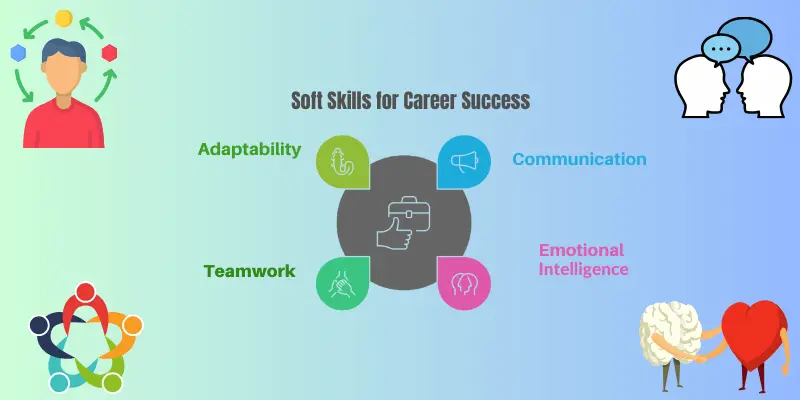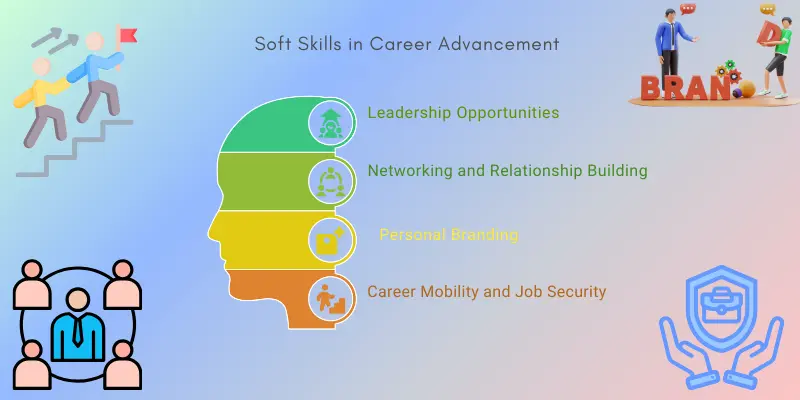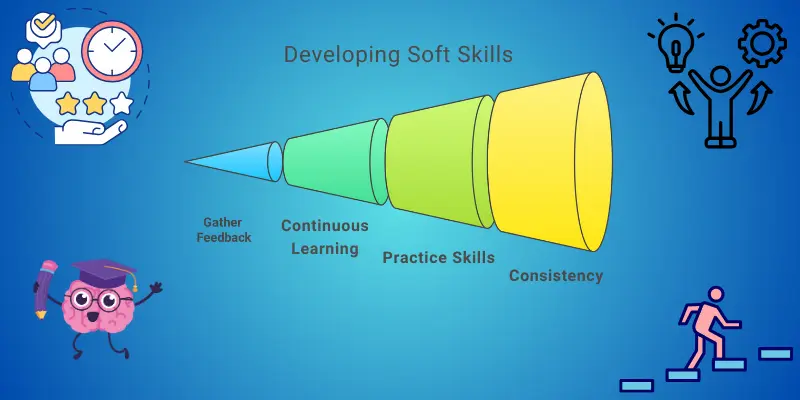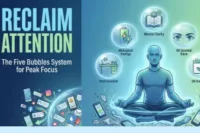Why Soft Skills Are Your Secret Weapon for Career Advancement
Published: 28/03/2025
You’ve worked hard to master your technical skills. You’ve got the certifications, the experience, and the expertise. But somehow, it feels like your career is plateauing. You’re passed over for promotions, overlooked for leadership roles, or stuck in a job that doesn’t excite you anymore.
It’s frustrating, right?
Here’s the truth: technical skills alone aren’t enough to move you forward. 93% of employers say soft skills, like communication, emotional intelligence, and problem-solving, are just as critical for career success.
“Technical skills may get you the job, but soft skills will get you the promotion.”Peggy Klaus, Leadership and Communication Expert
So why aren’t you advancing, even when you’re excelling at your job?
In this post, we’ll dive into how soft skills are the missing piece of the puzzle. You’ll learn:
- Why communication and emotional intelligence can set you apart from the competition.
- Practical tips for developing the soft skills that matter most.
- Common mistakes to avoid as you work on enhancing these crucial abilities.
Ready to break through the career barrier? Let’s explore how soft skills can be the game-changer you need to move up and stand out!
The Critical Soft Skills Every Professional Needs
In today’s workplace, soft skills are just as important—if not more so—than technical expertise. Soft skills are the personal traits that enable you to work well with others, adapt to change, and navigate the challenges of a professional environment.
Here are the key soft skills every professional should focus on to boost their career prospects:

Communication
Clear and effective communication is essential in any career. Whether you’re presenting ideas to a team, negotiating with clients, or simply sharing updates with colleagues, the ability to communicate well helps you build trust and ensures your ideas are understood.
Key Point: Being able to express your thoughts clearly and listen actively builds stronger professional relationships.
Emotional Intelligence (EQ)
Emotional intelligence is the ability to recognize, understand, and manage your emotions, as well as the emotions of others. This skill helps you handle stress, resolve conflicts, and build better relationships at work.
Key Point: High EQ allows you to manage workplace dynamics, navigate difficult situations with empathy, and lead with emotional insight.
Teamwork and Collaboration
In most workplaces, success relies on the ability to work well with others. Being a team player means contributing to group goals, respecting diverse viewpoints, and offering support to colleagues when needed.
Key Point: Teamwork promotes innovation, and effective collaboration leads to greater productivity and job satisfaction.
Adaptability and Problem-Solving
The ability to adapt to new challenges and find creative solutions to problems is critical in today’s fast-paced work environment. Employers value professionals who can think on their feet and adjust to changing conditions.
Key Point: Being flexible and resourceful allows you to thrive in uncertain situations and contribute to the long-term success of your team or organization.
How Soft Skills Impact Career Advancement
Soft skills play a huge role in career advancement, helping you stand out, build relationships, and open doors to new opportunities.
While technical skills are necessary, it’s your soft skills that often determine whether you’re considered for leadership roles or promoted within your organization. Here’s how these skills can shape your career:

Leadership Opportunities
Have you ever noticed how some managers are able to lead effectively while others struggle? Strong communication and emotional intelligence are key to successful leadership.
A manager who listens actively, empathizes with their team, and clearly communicates goals will earn the trust and respect of others, leading to greater leadership opportunities.
Key Point: Leaders who can understand and connect with their team are more likely to inspire and guide others, which opens doors to higher-level positions.
The best leaders aren’t the smartest in the room—they’re the ones who create psychological safety so others can be their bestAmy Edmondson, Harvard Professor & Author of The Fearless Organization
Networking and Relationship Building
Think about the professionals you admire. What makes them so successful? Chances are, they’ve built strong relationships through their networking skills. Soft skills like empathy, active listening, and rapport-building make it easier to connect with others, which in turn builds a network that supports career growth.
Key Point: Your professional network is crucial to unlocking new job opportunities and career paths, and your soft skills are what help you nurture those connections.
Personal Branding
What do people think of when they think of you? Soft skills play a significant role in shaping your personal brand.
Being known as an excellent communicator, a creative problem-solver, or someone who can resolve conflicts effectively helps build your reputation and makes you more attractive to potential employers or collaborators.
Key Point: Your personal brand is influenced by how you interact with others, and showcasing your soft skills makes you stand out in your field.
Career Mobility and Job Security
Have you ever wondered why some professionals seem to easily move up the ladder while others get stuck in the same position? Strong soft skills can be the difference.
Professionals with emotional intelligence, adaptability, and good communication are more likely to be promoted or retained, even during times of organizational change or economic uncertainty.
Key Point: Soft skills increase your chances of career advancement and job security, as they make you valuable in any workplace setting, especially in tough job markets.
How to Build Soft Skills That Boost Your Career
Developing soft skills is a continuous journey, and just like any other skill, they improve with consistent effort and the right resources.
Here are some actionable steps you can take to sharpen your soft skills and set yourself up for career success:

Self-Assessment
The first step to improving any skill is knowing where you stand. Take some time to assess your current soft skills—what are your strengths, and where do you need improvement?
Ask for feedback from trusted colleagues or mentors to get a better understanding of your areas for growth.
Tip: Reflect on your communication style, emotional intelligence, and how well you collaborate with others. Feedback from people you trust can give you valuable insights.
Continuous Learning
Soft skills are constantly evolving, and there’s always room for improvement. Take advantage of online courses, workshops, and seminars to stay sharp.
Platforms like Coursera, LinkedIn Learning, and even local professional development workshops offer courses on everything from leadership to emotional intelligence.
Tip: Set a goal to complete at least one course or attend one workshop every few months to keep enhancing your skill set.
Practice and Feedback
There’s no better way to improve your soft skills than through practice. Look for real-world opportunities to develop your skills.
Join public speaking groups like Toastmasters, or volunteer to lead projects at work. These hands-on experiences allow you to practice in a supportive environment and receive constructive feedback.
Tip: Seek out feedback from colleagues after meetings or presentations to identify what you did well and what could be improved.
Consistency
Like working out at the gym, soft skills require regular practice to grow stronger. Whether it’s communicating more effectively in meetings, adapting to change, or managing emotions, consistency is key. Make a habit of using your soft skills every day.
Tip: Just like muscles, soft skills need regular “exercise” to stay sharp. Try to incorporate small improvements into your daily routine, like being more present in conversations or actively listening.
Don’t Make These Soft Skills Mistakes
When developing your soft skills, it’s easy to make mistakes that can hinder your progress. Here are a few common pitfalls to watch out for, and how you can avoid them:
Neglecting Soft Skills
Do you focus mainly on improving your technical skills at the expense of your soft skills? Many professionals make the mistake of thinking that technical abilities alone will get them ahead.
While technical skills are essential, neglecting soft skills can limit your career growth and make you less adaptable in today’s fast-changing work environments.
Tip: Don’t just hone your technical expertise—dedicate time to developing your communication, emotional intelligence, and teamwork skills to stay competitive.
Overconfidence in Soft Skills
Have you ever assumed you’ve mastered something just because it comes naturally to you? Assuming that soft skills are innate or that you already possess them can lead to stagnation.
Even if you’re good at communication or problem-solving, there’s always room for growth, and overestimating your abilities can stop you from learning and improving.
Tip: Stay humble and open to feedback. Regularly assess your soft skills and look for opportunities to improve. No one is perfect, and there’s always more to learn.
Lack of Consistency
Do you apply your soft skills consistently? One of the biggest mistakes is thinking that a one-time effort is enough.
Soft skills require ongoing attention and practice to stay sharp and continue growing. Without consistent application, you may lose the progress you’ve made, or your skills might not develop to their full potential.
Tip: Make soft skills a daily practice. Whether it’s listening more attentively, adapting to change, or improving your leadership abilities, keep working on these skills regularly to ensure they stay strong.
From Skills to Success: Take the Next Step in Your Career
Soft skills are an essential factor that can propel your career forward. To sum it up:
- Soft skills are just as important—if not more—than technical skills when it comes to career advancement.
- Key soft skills like communication, emotional intelligence, and adaptability play a vital role in leadership, networking, and building strong professional relationships.
- Regularly practicing and consistently improving soft skills will help you stand out and unlock new career opportunities.
Be careful not to neglect your soft skills in favor of only focusing on technical expertise. Overconfidence in your soft skills can also lead to stagnation. Consistency is key—develop these skills regularly and seek feedback to continue growing.
Ready to unlock your career potential with soft skills? Start by assessing your current strengths, set clear goals for improvement, and apply these skills daily. Share your thoughts in the comments for more career growth tips!
The path to career success isn’t just about what you know, but how you interact with others. Strengthen your soft skills, and watch as doors to leadership, influence, and growth open for you. Your career deserves it!
“The future of work is not just about what you know, but how you work with others. Soft skills are the foundation of success in any career.”LinkedIn Learning Report
Soft Skills Made Simple: Your Top Questions Answered
Both technical and soft skills are crucial for career success. However, as workplaces become more collaborative and dynamic, soft skills have become increasingly important for leadership and career progression.
Hard skills are specific, teachable abilities like coding or data analysis, while soft skills are interpersonal traits like communication, emotional intelligence, and teamwork that help you work well with others.
Absolutely! Being known for your soft skills, like being a great communicator or problem solver, helps you build a positive reputation. A strong personal brand can open doors to new career opportunities and professional connections.
Effective leaders aren’t just skilled in their area of expertise—they also excel at communicating, motivating others, and resolving conflicts. Soft skills like emotional intelligence and collaboration are essential for gaining leadership roles.
Yes, soft skills can absolutely be learned and developed over time. They require practice, feedback, and ongoing effort to improve, just like any other skill.

- Be Respectful
- Stay Relevant
- Stay Positive
- True Feedback
- Encourage Discussion
- Avoid Spamming
- No Fake News
- Don't Copy-Paste
- No Personal Attacks

- Be Respectful
- Stay Relevant
- Stay Positive
- True Feedback
- Encourage Discussion
- Avoid Spamming
- No Fake News
- Don't Copy-Paste
- No Personal Attacks





